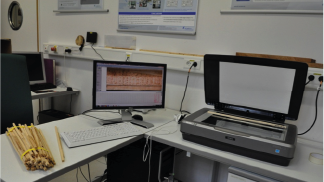Laboratory for Dendroclimatology
Contact:
Web:
Infrastructure belongs to:
The Dendroclimatology Laboratory serves for the reconstruction of temporal and spatial variability of the climate of the past utilizing multi-parameter tree ring analysis.
Aims:
- to reconstruct the temporal and spatial variability of the climate of the past utilizing multi-parameter tree ring analysis
- to assess and verify the causes of climate change and its impact on woody plants
Tasks:
-
quantitative analysis of the climate-signal transfer from atmosphere through soil and leaf into the wood of tree rings (Monitoring, calibration and verification of tree ring parameters vs. instrumental data),
-
to establish multi-centennial to millennium long time series of tree-ring parameters (ring width, cellstructure parameters, stable isotope ratios) for networks of sites from selected regions of the earth, and
-
comparative study of time series of climate proxies from different geo-archives (varved sediments, spelethemes, corals etc.).
Categories
Disciplinary Keywords
- Biology
- Confocal Laser Scanning Microscopy
- Dendrochronology
- High-Temperature Pyrolysis Isotope Ratio Mass Spectrometry
- Isotope Ratio Mass Spectrometry
- Laser Microdissection
- Microscopy
- Microtomy
- Paleoclimate
- Paleoenvironmental Change
- Paleogeoscience
- Tree Ring Analysis
- Tree-ring Measurement
- δ¹³C
- δ¹⁸O
Selected infrastructures
Instrumentation
The lab is equipped with various technical field equipment, sample preparation tools, a LINTAB tree-ring measurement system and a calibrated optical scanner incl. analsysis software for dendrochronology, instruments to determine the wood chemistry (i.e. cellulose extraction), a confocal laser scanning microscope for the analysis of quantitative wood anatomy and wood density determination as well as two isotope ratio mass spectrometer for stable isotope analyses of tree rings.
Instruments
-
Belt Sander
-
Binocular
A pair of identical or mirror-symmetrical telescopes mounted side-by-side and aligned to point accurately in the same direction, allowing the viewer to use both eyes (binocular vision) when viewing distant objects. Most are sized to be held using both hands, although sizes vary widely from opera glasses to large pedestal mounted military models. (Source: Global Change Master Directory (GCMD). 2023. GCMD Keywords, Version 16.3. Greenbelt, MD: Earth Science Data and Information System, Earth Science Projects pision, Goddard Space Flight Center (GSFC) National Aeronautics and Space Administration (NASA). URL (GCMD Keyword Forum Page): https://forum.earthdata.nasa.gov/app.php/tag/GCMD+Keywords)
-
Confocal Laser Scanning Microscope
-
High-Temperature Pyrolysis Isotope Ratio Mass Spectrometer
-
Increment Borer
-
Isotope Ratio Mass Spectrometer
Measurement and study of the relative abundances of the different isotopes of an element in a material using a mass spectrometer. (Source: IUPAC; https://doi.org/10.1351/PAC-REC-06-04-06)
-
Laser Microdissection Microscope
-
Microtome
Laboratory methods using special instruments, or microtomes, to cut very thin slices of specimens for microscopic studies. (Source: USGS; https://apps.usgs.gov/thesaurus/term-simple.php?thcode=2&code=741)
-
Optical Scanner
-
Saw
Links
Key Publication
- Rinne-Garmston, K. T., eat al. (2022): Newer developments in tree-ring stable isotope methods. - In: Siegwolf, R. T. W., Brooks, J. R., Roden, J., Saurer, M. (Eds.), Stable Isotopes in Tree Rings. ham : Springer International Publishing, 135-190.
- Schollaen, K., Heinrich, I., Helle, G. (2014): UV-laser-based microscopic dissection of tree rings - a novel sampling tool for δ13C and δ18O studies. - New Phytologist, 201, 3, 1045-1055.
